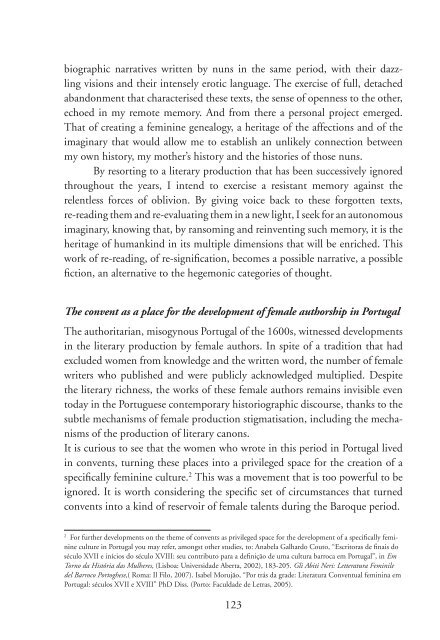Teaching Subjectivity. Travelling Selves for Feminist ... - MailChimp
Teaching Subjectivity. Travelling Selves for Feminist ... - MailChimp
Teaching Subjectivity. Travelling Selves for Feminist ... - MailChimp
You also want an ePaper? Increase the reach of your titles
YUMPU automatically turns print PDFs into web optimized ePapers that Google loves.
iographic narratives written by nuns in the same period, with their dazzling<br />
visions and their intensely erotic language. The exercise of full, detached<br />
abandonment that characterised these texts, the sense of openness to the other,<br />
echoed in my remote memory. And from there a personal project emerged.<br />
That of creating a feminine genealogy, a heritage of the affections and of the<br />
imaginary that would allow me to establish an unlikely connection between<br />
my own history, my mother’s history and the histories of those nuns.<br />
By resorting to a literary production that has been successively ignored<br />
throughout the years, I intend to exercise a resistant memory against the<br />
relentless <strong>for</strong>ces of oblivion. By giving voice back to these <strong>for</strong>gotten texts,<br />
re-reading them and re-evaluating them in a new light, I seek <strong>for</strong> an auto nomous<br />
imaginary, knowing that, by ransoming and reinventing such memory, it is the<br />
heritage of humankind in its multiple dimensions that will be enriched. This<br />
work of re-reading, of re-signification, becomes a possible narrative, a possible<br />
fiction, an alternative to the hegemonic categories of thought.<br />
The convent as a place <strong>for</strong> the development of female authorship in Portugal<br />
The authoritarian, misogynous Portugal of the 1600s, witnessed developments<br />
in the literary production by female authors. In spite of a tradition that had<br />
excluded women from knowledge and the written word, the number of female<br />
writers who published and were publicly acknowledged multiplied. Despite<br />
the literary richness, the works of these female authors remains invisible even<br />
today in the Portuguese contemporary historiographic discourse, thanks to the<br />
subtle mechanisms of female production stigmatisation, including the mechanisms<br />
of the production of literary canons.<br />
It is curious to see that the women who wrote in this period in Portugal lived<br />
in convents, turning these places into a privileged space <strong>for</strong> the creation of a<br />
specifically feminine culture. 2 This was a movement that is too powerful to be<br />
ignored. It is worth considering the specific set of circumstances that turned<br />
convents into a kind of reservoir of female talents during the Baroque period.<br />
2<br />
For further developments on the theme of convents as privileged space <strong>for</strong> the development of a specifically feminine<br />
culture in Portugal you may refer, amongst other studies, to: Anabela Galhardo Couto, “Escritoras de finais do<br />
século XVII e inícios do século XVIII: seu contributo para a definição de uma cultura barroca em Portugal”, in Em<br />
Torno da História das Mulheres, (Lisboa: Universidade Aberta, 2002), 183-205. Gli Abiti Neri: Letteratura Feminile<br />
del Barroco Portoghese,( Roma: Il Filo, 2007). Isabel Morujão, “Por trás da grade: Literatura Conventual feminina em<br />
Portugal: séculos XVII e XVIII” PhD Diss. (Porto: Faculdade de Letras, 2005).<br />
123

















